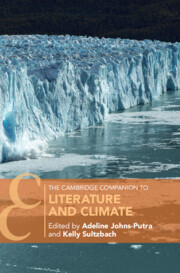Book contents
- The Cambridge Companion to Literature and Climate
- The Cambridge Companion to Literature and Climate
- Copyright page
- Contents
- Figures
- Notes on Contributors
- Introduction
- Part I Historical Shifts in Climate Consciousness
- Part II Current Issues in Climate Change Criticism
- 4 Scales
- 5 Capitalist Cultures
- 6 Animals and Extinction
- 7 Climate Justice and Literatures of the Global South
- Part III Ways of Telling Climate Stories
- Part IV Dialogic Perspectives on Emerging Questions
- Selected Bibliography
- Index
- Cambridge Companions to …
5 - Capitalist Cultures
The Taste of Oil
from Part II - Current Issues in Climate Change Criticism
Published online by Cambridge University Press: 31 March 2022
- The Cambridge Companion to Literature and Climate
- The Cambridge Companion to Literature and Climate
- Copyright page
- Contents
- Figures
- Notes on Contributors
- Introduction
- Part I Historical Shifts in Climate Consciousness
- Part II Current Issues in Climate Change Criticism
- 4 Scales
- 5 Capitalist Cultures
- 6 Animals and Extinction
- 7 Climate Justice and Literatures of the Global South
- Part III Ways of Telling Climate Stories
- Part IV Dialogic Perspectives on Emerging Questions
- Selected Bibliography
- Index
- Cambridge Companions to …
Summary
This essay analyses how material formations of class are related to its symbolic trappings and why such an analysis may be currently relevant. Ecocriticism’s tendency to avoid work-based class analysis may be an effect of petroculture, whose flowing, accommodating logic reduces analysis to critique and reduces intervention to consumer choices. This essay argues that a confrontation between work, class, environmentalism, and narrative could be accomplished via the genre of the ‘boom narrative’. Boom narratives deal with signs of class stratification as well as the labour involved in resource extraction. Those based on actual events, such as the natural gas boom in North Dakota, travel widely, into journalistic and documentary coverage, and this coverage draws on and sometimes subverts boom narrative conventions. Television shows, including The Beverly Hillbillies and Dallas, helped instal petrocultural logic. An understanding of boom narratives’ appeal, and how their conventions get deployed, critiqued, and subverted intervenes in the flow of petrologic. Such intervention would require keeping work the focus of class, and keeping material effects of class the focus of narrative analysis. Intervention may also require more ecumenical approaches to genre, and rethinking scholarly modes of critique.
Keywords
- Type
- Chapter
- Information
- The Cambridge Companion to Literature and Climate , pp. 87 - 99Publisher: Cambridge University PressPrint publication year: 2022

